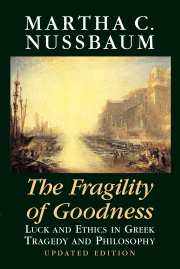Book contents
- Frontmatter
- Contents
- Preface to the revised edition
- Preface
- Acknowledgements
- Abbreviations
- Chapter 1 Luck and ethics
- Part I Tragedy: fragility and ambition
- Part II Plato: goodness without fragility?
- Introduction
- Chapter 4 The Protagoras: a science of practical reasoning
- Interlude 1 Plato's anti-tragic theater
- Chapter 5 The Republic: true value and the standpoint of perfection
- Chapter 6 The speech of Alcibiades: a reading of the Symposium
- Chapter 7 ‘This story isn't true’: madness, reason, and recantation in the Phaedrus
- Part III Aristotle: the fragility of the good human life
- Notes
- Bibliography
- General index
- Index of passages
Chapter 5 - The Republic: true value and the standpoint of perfection
Published online by Cambridge University Press: 05 June 2013
- Frontmatter
- Contents
- Preface to the revised edition
- Preface
- Acknowledgements
- Abbreviations
- Chapter 1 Luck and ethics
- Part I Tragedy: fragility and ambition
- Part II Plato: goodness without fragility?
- Introduction
- Chapter 4 The Protagoras: a science of practical reasoning
- Interlude 1 Plato's anti-tragic theater
- Chapter 5 The Republic: true value and the standpoint of perfection
- Chapter 6 The speech of Alcibiades: a reading of the Symposium
- Chapter 7 ‘This story isn't true’: madness, reason, and recantation in the Phaedrus
- Part III Aristotle: the fragility of the good human life
- Notes
- Bibliography
- General index
- Index of passages
Summary
I am amused, I said, that you seem to be afraid of the many, in case they should think that you are prescribing useless studies. It is no trivial matter at all, but a difficult one, to realize that there is in the soul of each of us an organ or instrument that is purified and rekindled by mathematical studies, when it has been destroyed and blinded by our ordinary pursuits, an organ whose preservation is worth more than that of ten thousand eyes, for by it alone is the truth seen. Those who share this belief will think your proposal surpassingly good; those who have never had any perception of these things will probably think that you are talking nonsense – for they don't see any other advantage worth speaking of in these pursuits.
Republic 527d–ePlato's assault on the goodness of the ordinary opens on a scene of daily Athenian life. Socrates (who still believes that philosophy can be practiced as one element in the life of the democratic citizen) goes down from Athens to the Piraeus. With him is Glaucon, older brother of Plato. The year is probably 421, during the Peace of Nicias: a time of rest and relative stability. By the time of composition, about fifty years later, most of the dialogue's principal characters are dead, and few of them peacefully. Three (Polemarchus, Niceratus, and Socrates) have been executed on political charges; the first two were brutally murdered for their fortunes by an oligarchic faction led by members of the family of Plato.
- Type
- Chapter
- Information
- The Fragility of GoodnessLuck and Ethics in Greek Tragedy and Philosophy, pp. 136 - 164Publisher: Cambridge University PressPrint publication year: 2001



